| Srl | Item |
| 1 |
ID:
109718
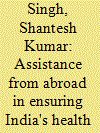

|
|
|
| 2 |
ID:
193374
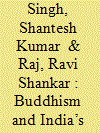

|
|
|
|
|
| Summary/Abstract |
The phenomenon of soft power has garnered greater attention within the field of international relations, setting it apart from conventional hard power instruments, such as military might and economic power. In light of the ongoing evolution of the geopolitical environment, it is evident that governments are progressively using soft power as a means of exerting international influence in conjunction with hard power. India, where Buddhism originated, has been progressively using its soft power to acquire strategic benefits and cultivate closer relationships with surrounding nations and beyond.
|
|
|
|
|
|
|
|
|
|
|
|
|
|
|
|
| 3 |
ID:
138371
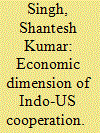

|
|
|
|
|
| Summary/Abstract |
The public health security has been a prime concern in India since independence. It has been related to food security, child and maternal health, malaria, tuberculosis, diarrhea, influenza etc in the beginning. All such problems have accompanied the biggest menace of the recent times for humankind, the HIV/AIDS.
|
|
|
|
|
|
|
|
|
|
|
|
|
|
|
|
| 4 |
ID:
193326
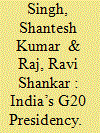

|
|
|
|
|
| Summary/Abstract |
The G20 is a significant forum for discussing global economic and financial concerns among the world’s largest economies. The Asian financial crisis of 1999 marked its birth. The G20 was established so that finance ministers and central bank governors could address global economic and financial issues. Nonetheless, the 2008 financial crisis necessitated the introduction of G20 gatherings for heads of state. Since then, leaders of the G20 have convened regularly, making it the premier platform for economic cooperation. Since 2011, the G20 has held a summit annually, with a new country serving as host each time. On 1 December 2022, India took the G20 presidency for a year, and the heads of state and other delegates will tour around the country. During its G20 presidency, India can display its soft power to visiting delegations.Within the scope of this paper, four primary considerations will be highlighted.
|
|
|
|
|
|
|
|
|
|
|
|
|
|
|
|
| 5 |
ID:
193341


|
|
|
|
|
| Summary/Abstract |
India and Southeast Asia have collaborated on a wide range of issues, from economic partnership to strategic association. There exist many opportunities for augmenting the extent and magnitude of collaborations between India and ASEAN (Association of Southeast Asian Nations) in the domain of healthcare too. These two regions are home to more than 25% of the global population. Collaboratively, they have the potential to enhance worldwide health and mitigate health disparities.
|
|
|
|
|
|
|
|
|
|
|
|
|
|
|
|
| 6 |
ID:
148578
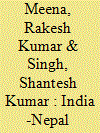

|
|
|
|
|
| Summary/Abstract |
In addition to the issues that have been discussed, there are also various sins of omission and commission which have hurt Indo-Nepal ties. India’s relations with its neighbours in South Asia – all of whom are smaller in size than India – have never been amicable and tension-free. India has often acted as the big brother and not taken adequate notice of how its behaviour is perceived in these countries.
|
|
|
|
|
|
|
|
|
|
|
|
|
|
|
|
| 7 |
ID:
165537
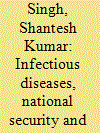

|
|
|
|
|
| Summary/Abstract |
Shantesh Kumar Singh notes the growing importance of health as a critical factor in human and national security due to its links with the economy, the stability of state institutions and public morale. Worsening socioeconomic inequalities are responsible for the vulnerability of both disadvantaged and affluent populations. Reforms of the current economic system are needed to comprehensively address the challenges posed by communicable viral and microbial infections.
|
|
|
|
|
|
|
|
|
|
|
|
|
|
|
|
| 8 |
ID:
189616
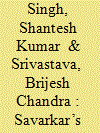

|
|
|
|
|
| Summary/Abstract |
Since his death in 1969, Vinayak Damodar Savarkar has been under studied and over simplified. Despite being a prominent socialist theorist, he has been ignored by philosophical, religious, and political fields in India. This is because he has been branded as a radical nationalist during the course of his life. His popular work “Hindutva: Who Is a Hindu?” explores the concept of Hindu Rastra and paints a specific picture of India and the Hindutva philosophy. Over the course of time, this text became the Hindu religion’s guiding document. He created the concept of Hindu Rastra, which is important to understand in this era of Hindu nationalism in Indian politics. This article makes an effort to get to the bottom of Savarkar’s philosophy of Hindutva and his book Hindutva: Who is a Hindu? in simple terms.
|
|
|
|
|
|
|
|
|
|
|
|
|
|
|
|